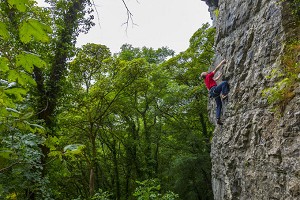
The biggest sporting event of 2020 is on the horizon and athletes are currently in limbo as the Tokyo 2020 Olympics look increasingly likely to be postponed, following the news this morning that Canada and Australia will not be sending athletes to a summer 2020 Games. Ahead of Sport Climbing's Olympic debut, selected athletes and hopefuls have been doing what they can to remain fit and informed while retaining a sense of perspective on the wider situation and giving back to their supporters in creative ways...
UPDATE: 24/03 - The IOC and Japanese organising officials have come to a mutual agreement to postpone the Tokyo 2020 Games to 'a date beyond 2020 but not later than summer 2021' due to the ongoing COVID-19 pandemic.
Lurking in the background noise somewhere within the soundscape of the COVID-19 pandemic are shouts and murmurs on the unresolved fate of the Tokyo 2020 Olympic Games, as countries begin to unilaterally pull out. It's fair to say that there are far more pressing issues to be concerned with during a global health crisis than the status of "The Greatest Show on Earth", but the Olympics has nonetheless historically been an immovable feast; threatened by boycotts and scandals, but cancelled only in times of war. As an event which is expected to attract millions of visitors to witness more than 11,000 athletes from over 200 nations compete across multiple Japanese prefectures, the very premise of the Games - a global coming-together in a shared celebration of sport - threatens its existence in the face of a highly contagious viral pandemic.
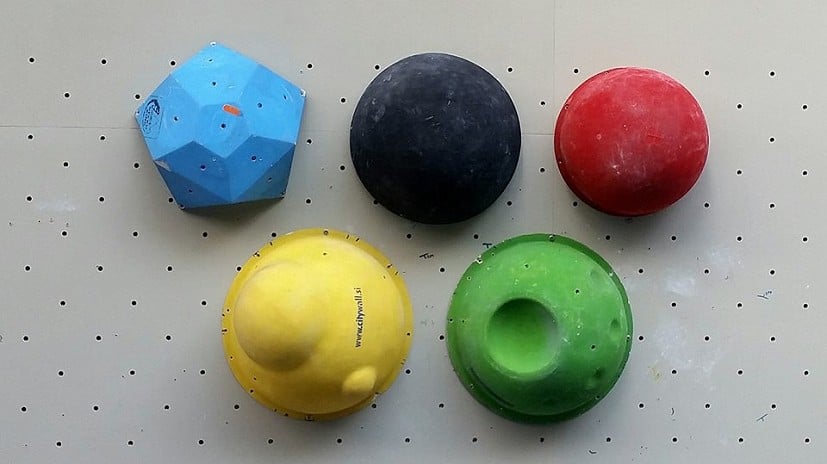
For the 30 athletes who have qualified for Sport Climbing's Olympic debut, the current limbo-state ads to the unknown of being an athlete in a new Olympic sport. Through contacting multiple athletes, there's a sense that speaking out about the Olympics and expressing even minor frustration about being unable to train whilst people are fighting for their lives during a global health crisis would appear tone-deaf; a feeling of guilt for worrying about something as 'trivial' as the Olympics. There's nothing like a global health crisis to put things into perspective, after all. But Tokyo nonetheless remains an elephant in the room for many who have been working towards the pinnacle of their competition climbing career, due to take place in August, as sporting events drop off the calendar one by one.
Last week, the IOC maintained the stance that the Games 'will go ahead as planned' from July, but this week, IOC President Thomas Bach appeared to change his tune under increasing pressure from athletes and sports federations, claiming that the IOC are 'considering different scenarios.' Yesterday (22 March), Reuters reported that organisers were quietly planning for a potential Olympic delay, despite the Japanese government's insistence that postponement was off the cards last week. Hours later, the IOC officially announced a 'step-up in scenario planning' for the Games, in which health and safety will be 'paramount'. Today (23 March), Canada and Australia announced a withdrawal of their athletes from the Games this summer, calling for a postponement to 2021. This move is likely to precipitate further fallout and a response or decision from the IOC.
Canadian Olympic-qualified climber Alannah Yip wrote on Instagram: 'I am proud to be from a country that is being a leader by putting the health and safety of the global community above all else. Thank you @teamcanada for doing the right thing in this time of global crisis. I hope that the IOC will postpone the Games because this pandemic is bigger than sport.'⠀⠀⠀⠀
***
The 'different scenarios', an IOC news release reads, relate to modifying existing operational plans for the Games to go ahead on 24 July 2020, and also for changes to the start date of the Games. Cancellation is 'not on the agenda.' With $3 billion deals in domestic sponsorship, $12 billion spent on preparations and a large wad of national pride on the line, shifting the Games will likely come at a high price for Japan, whose Prime Minister Shinzo Abe is banking on the economic windfall of the Games and its associated tourism boom. Money aside, Abe has expressed a desire to use the go-ahead of the Games as a symbol of humanity's resilience. 'I want to hold the Olympics and Paralympics perfectly, as proof that the human race will conquer the new coronavirus,' he commented last week.
The organising committee are hoping to finalise discussions 'within the next four weeks.' Anonymous sources had revealed to Reuters before the official IOC announcement that options including a downscale of the Games, or closed-doors events are up for debate, while a postponement of one or two years is also being discussed. Ultimately, the decision will fall into the IOC's hands, but Japan's opinion holds some sway in their choice. Bach's initial unyielding optimism and opaque statements regarding the situation outraged athletes and governing bodies from various sports around the world, who claim that the lack of transparency was forcing competitors to continue training during the outbreak and putting lives at risk. Japan's deputy Prime Minister, Taro Aso, cited a '40-year Olympic curse', in reference to the cancellation of the 1940 Games due to World War II, and the boycott of the 1980 Games in Moscow.
Jinxed or not, the complexities of rescheduling the Games involves a tangled web of big numbers, involving sponsorship contracts, stakeholder agreements, infrastructure arrangements, sporting calendar dates and television schedules, which won't be quick to calculate and reorganise, Michael Payne, former Olympic Games sponsor strategist known as the 'Father of Olympic Branding', argued in a Twitter post. 'Postponing the Games takes more than couple of phone calls with Japan. IOC leadership are not stupid - give them time to get it right!' Regarding shifting sponsorship negotiations, Payne disagrees with the general consensus. He commented cryptically in a tweet: 'Some say problems for sponsors - respectively disagree. Only upside.'
While organisational logistics are juggled, for the athletes who have already punched their ticket to Tokyo - and those hopeful of filling remaining quota places in cancelled-and-yet-to-happen qualification events - there's a low-grade anxiety as to what will happen. Hopes, dreams and sponsorship contracts are up in the air. To date, only 57% of available Olympic spots have been allocated to athletes, and the IFSC calendar is currently one long list of rescheduled and postponed selection events. With public sporting facilities shutting across the globe and lockdowns preventing athletes from business-as-usual - i.e. training - high-profile sporting figures such as Katarina Johnson-Thompson openly criticised the IOC for their apparent lack of concern or communication and lobbied National Olympic Committees to campaign for postponement, or at least some information on the decision-making process. Meanwhile, the Olympic Flame set off on its journey from Greece to Japan, where it arrived on 20th March. Thousands flocked to visit the flame despite the fears; after all, Olympic fever is likely not the only thing spreading as preparations for the Games ramp up.
In the climbing sphere, Jan Hojer, who qualified for Tokyo in the Toulouse selection event, has returned home to Germany after training in the UK and competing in CWIF, where he is facing a potential lockdown situation. 'I flew back to Cologne, Germany where I am right now,' he told UKC. 'At the moment we are being asked to practise social distancing, but tomorrow it will be decided whether North Rhine-Westphalia will follow the Bavarian example with some stricter rules.'
All of the climbing walls in Germany closed about a week ago, which forced Hojer - like many others around the world - to train at home with minimal equipment. 'Right now we are sticking to our yoga mats, pull up bars and fingerboards whilst our federation tries to find a way to let national team athletes train, one at a time at a climbing gym.'
Regarding the potential postponement of the Games, Hojer is equanimous and looking at the bigger picture. 'I'm not surprised by the IOC's initial plans to stick to the schedule. There's a lot of money on the line and they have a strong lobby,' he explained. 'Nevertheless, the first priority should be everyone's safety. Whether that means a postponement or even cancellation of the Games, and how much that would cost anyone, shouldn't really matter.'
'As an athlete, of course I hope I get a chance to compete at the Olympics at some point, but right now there's a more important problem to be solved.'
Some Tokyo hopefuls already have pre-exisiting home boards and cellars that would attract many a membership if opened to the public. Shauna Coxsey has been training on her cellar board, while across the pond in the USA, the youngest Sport Climbing athlete to qualify so far, 16-year-old Colin Duffy, has reacquainted himself with his impressive home board.
Duffy's teammate Kyra Condie, also Olympic-qualified, can make limited use of a national training facility. 'We have a training centre for the US team here in Salt Lake City that has remained open with very limited access, about ten people, never all there at the same time, with CDC protocols in place, but I've been trying to do as much stuff from home to limit time out in public,' Condie told UKC. 'I have a hangboard and will build a wall in my attic so that I can have something to train on when we inevitably get the "shelter in place" order and the training centre has to close to everyone. I'm also debating taking up running again just to have something to do outside of the house and keep the mind and body happy. I feel pretty confident in my ability to maintain my strength without climbing gyms for the time being though.'
Others are less fortunate, and the lack of access to training facilities has caused coaches, athletes and amateurs across the globe to 'think outside the climbing gym' and get creative. Olympic-selected athlete Jessy Pilz of Austria has enlisted the help of her dad in building a campus board and fingerboard facility in her garage, while Austria Climbing Team coach Katharina Saurwein has held virtual group training sessions with strength and conditioning exercises for athletes via a conference call app.
Pilz described the situation in Austria, which is under full lockdown. 'All public facilities, shops and restaurants are closed except grocery stores and pharmacies,' she told UKC. 'We are not allowed to leave the house except for grocery shopping or an urgent doctor's visit. This also means that sports centres are closed and we can't go to the climbing gym.'
Using her resourcefulness, Pilz has been able to maintain a makeshift fitness routine of sorts while staying at home. 'We have to improvise as much as possible to stay strong during this lockdown,' she told UKC. 'My dad built me a hangboard in the garage, so I can train my finger and arm strength. I do a lot of other exercises for my legs and core to stay fit, too. Also, the Austrian climbing federation started to livestream some training sessions for all our athletes. That helps a lot to keep up motivation and not feel alone during these hard times. My plan for the next weeks is to keep my fitness level where it was before the crisis and to stay positive.'
When asked how she felt about a likely postponement of the Tokyo Games, Pilz raised concerns about her readiness if they go ahead as planned and the disparity between the options available to athletes. 'It's a super hard decision to make and we don't know yet how long this virus will remain. For me, it is impossible to continue my training and preparation as planned because I can't go to the climbing gym,' she said. 'Not climbing for more than a month is a very long time and it will be a challenge to be perfectly prepared for the Olympics.' Pilz echoed Hojer's sentiment that priorities have shifted somewhat. 'I would be happy about a postponement because health is more important right now,' she explained, 'and as the situation is different in every country it wouldn't be fair for the athletes, as some can train properly as normal and others have to stay home for weeks.'
Meanwhile, several athletes are sharing tips and motivation for the climbing community as the fingerboard frenzy continues and home (board)-dom ensues. American Brooke Raboutou embraced the quite-literally-climbing-the-walls-at-home trend and filmed the first ascent of her living room and a tree pull-up session in the garden, while acknowledging that she is lucky to have a home board. Alberto Ginés López of Spain has already experienced an inevitable hurdle of home-training: his dog demanding undivided attention. "Let me train!" he captioned a video. In Canada, Sean McColl is posting videos of his cat and setting himself daily challenges, coining the #plankRubixCubechallenge and taking part in the trending #bananalockchallenge. Adam Ondra - arguably one of the most training-obsessed athletes - thoughtfully used his platform of 574K followers to urge people to stay at home. He wrote on Instagram: 'These are not easy times. To not only protect yourself, but most importantly protect the more vulnerable members of our society, please follow the rules imposed by our governments which in many countries, including my own country, mean - stay at home!'
On a wider scale, the climbing community as a whole has been embracing stay-at-home sessions and sharing the results on social media through 'see 10 - do 10 - share 10' challenges, fingerboard head-to-heads and core competitions in an effort to keep the world moving. Legends of the Masters of Stone video series, including Yuji Hirayama, adopted the #MastersAtHome hashtag to challenge his contemporaries on their finger and home boards.
Although these home training adaptations might be inconvenient, they also mean that compared to other sports, climbing is relatively unaffected by facility closures. Track and field, swimming and gymnastics all require space, apparatus and facilities that are more cumbersome and less easily mimicked at home (all credit to the guy who ran a marathon on his 7-metre balcony while on lockdown in France, though). An obvious exception is the IFSC homologated Speed route, which are few and far-between globally. Athletes need to train specifically on this route regularly to retain muscle memory.
While his country was the first to lock-down to slow the devastating spread of COVID-19 in Italy, Olympic hopeful - as yet unqualified - Stefano Ghisolfi has been doing his bit to stay at home and keep spirits high. He livestreamed a table-climbing challenge, has been running virtual fingerboard workshops while confined to his house and shared a gallery of his favourite home board constructions sent in by followers for inspiration. Most importantly, though, Ghisolfi has not shyed away from sharing the reality of what is going on in his country as an example of what might be coming to other nations in the coming weeks. 'Medics and nurses are working harder than ever, they are putting their lives at risk and getting sick and dying too,' he wrote on Instagram, under a gallery of hard-hitting photographs. 'They are real life super heroes, and they are asking us to help them. They are not asking to go to war, or to go to hospitals and help them on the field, they just asked us to stay home to reduce and delay the contagion. Please, it is a simple rule, even if you are in a country with no restrictions at all, try to stay home and help everyone to defeat this virus.' Ghisolfi's compatriot and Olympic-qualifed athlete Laura Rogora posted pictures emphasising the Italian #distantimauniti (Distant but United) and #iorestoacasa (I Stay at Home) social distancing campaigns. Rogora is currently quarantining in a training facility.
The Mawem brothers, both of whom have punched tickets to Tokyo, have been training together on Réunion Island, where the impact of COVID-19 is less severe and the consequent governmental management procedures are currently more relaxed than in mainland France. The pair have access to a climbing wall, but not a speed wall - which is Bassa's strongest discipline. Demonstrating the athletes' committment to the Games and the difficult decisions that many face in the current climate is the fact that by staying on the island, Mickaël is separated from his girlfriend in the mainland. As families pull together, many athletes are currently having to choose between staying with family members or remaining in their usual training locations. In these times of low morale, future Olympian Tomoa Narasaki, like many people, turned to humour:
As for those who are yet to claim one of the eight remaining Olympic berths in the 2020 Continental Championships, they will be keeping a close eye on the IFSC calendar in the coming weeks and months. IFSC President Marco Scolaris commented in a press release: 'After the postponement of a number of competitions, the IFSC set its priority on the rescheduling of the four remaining continental championships before June 30. The IFSC also set a deadline on May 15 for the confirmation that each competition can be held. If any of the four championships could not be held, the updated Qualification System ensures that the Continental quota places will be awarded according to the ranking of the 2019 IFSC Climbing World Championships.' The IFSC European Championships in Moscow, which ordinarily would have been taking place this week, have provisionally been rescheduled to 15-22 June.
GB Climbing Team athlete Will Bosi still has one more chance to earn an Olympic quota place, if the European Championships go ahead. 'Since the government advice on social distancing was announced I relocated back to my home in Edinburgh where I am lucky enough to have a home board so I could carry on training indoors,' he told UKC. 'The areas which may suffer in the short term is training for speed climbing as you need time on the wall and practising on comp simulation routes and boulder problems, but that will have to take a back seat for now as frankly, the current situation is much more important than climbing.'
***
It's looking likely that even the sporting stalwart that is the Olympic Games is not immune to the novel coronavirus. Nor should it be, for as IOC President Thomas Bach stated in a press conference on 17 March: "The health and well-being of all those involved in the preparations for the Olympic Games Tokyo 2020 is our number-one concern." That goes for the rest of the world outside of the Games, too. Tokyo 2020 might turn out to be the Greatest No-Show on Earth, but the Tokyo Games will go on, probably in 2021. When the time comes, Sport Climbers will likely have stronger fingers than ever.
The 'Father of the Olympic Games', Pierre de Coubertin, expressed his Olympic philosophy as follows: 'The most important thing in the Olympic Games is not to win but to take part, just as the most important thing in life is not the triumph but the struggle. The essential thing is not to have conquered but to have fought well.'
The world certainly has a fight on its hands, and if the (virtual) coming together that the climbing community - and much of the wider world - has demonstrated in recent weeks is anything to go by, we will be on the road to Tokyo with increased compassion and cooperation. Global health, after all, is worth its weight in gold.
- SKILLS: Top Tips for Learning to Sport Climb Outdoors 22 Apr
- INTERVIEW: Albert Ok - The Speed Climbing Coach with a Global Athlete Team 17 Apr
- SKILLS: Top 10 Tips for Making the Move from Indoor to Outdoor Bouldering 24 Jan
- ARTICLE: International Mountain Day 2023 - Mountains & Climate Science at COP28 11 Dec, 2023
- ARTICLE: Did Downclimbing Apes help Evolve our Ultra-Mobile Human Arms? 5 Dec, 2023
- ARTICLE: Dàna - Scotland's Wild Places: Scottish Climbing on the BBC 10 Nov, 2023
- INTERVIEW: Loki's Mischief: Leo Houlding on his Return to Mount Asgard 23 Oct, 2023
- INTERVIEW: BMC CEO Paul Davies on GB Climbing 24 Aug, 2023
- ARTICLE: Paris 2024 Olympic Games: Sport Climbing Qualification and Scoring Explainer 26 Jul, 2023
- INTERVIEW: Malcolm Bass on Life after Stroke 8 Jun, 2023




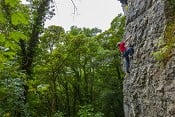
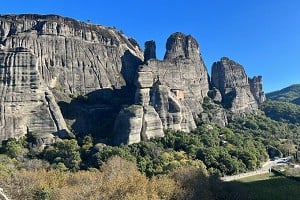
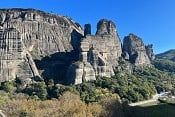
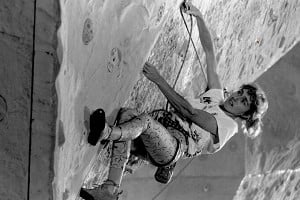
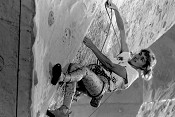







Comments
UPDATE: 23/03 - IOC member Dick Pound has confirmed that the Tokyo 2020 Games will be postponed, likely to 2021: https://eu.usatoday.com/story/sports/olympics/2020/03/23/olympics-2020-ioc-member-tokyo-games-postponed-dick-pound-coronavirus/2899848001/